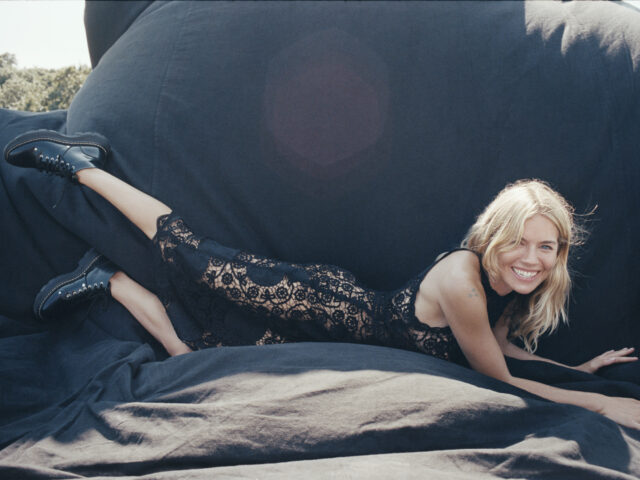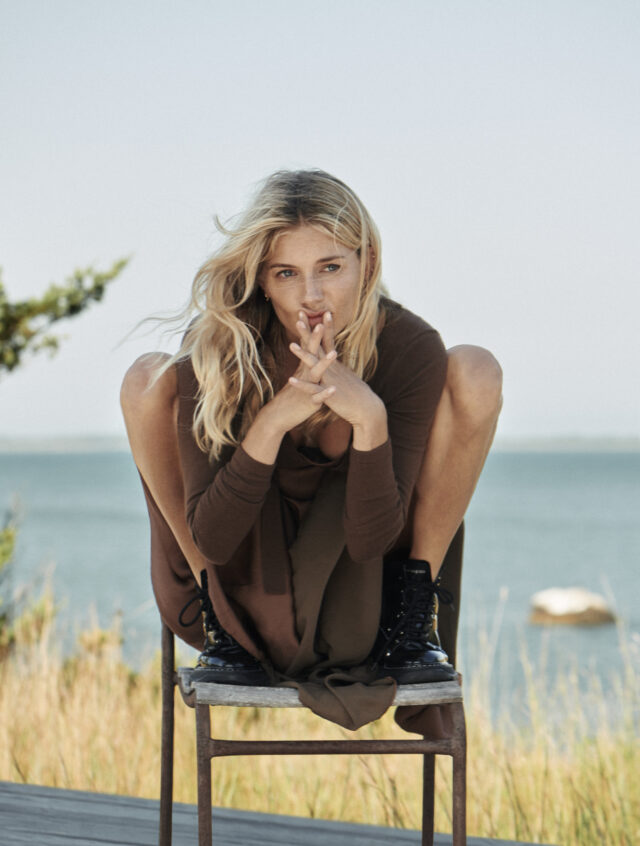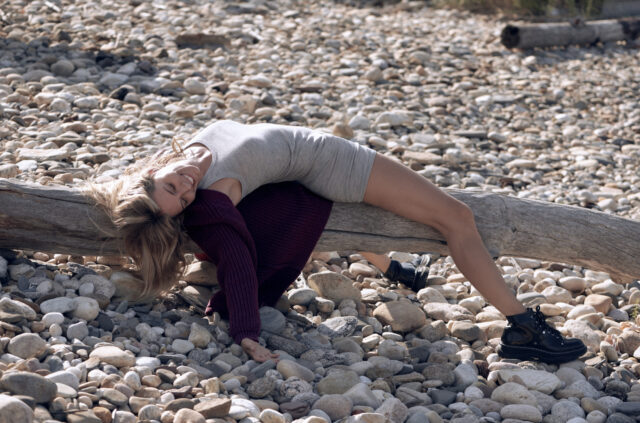
you have kids,” says Miller. “You make it work.” Photography by Cass Bird
Cristina Cuomo: First of all, your film, Wander Darkly, is fantastic. What was the hardest part about playing a role where you’re in purgatory, stuck in time?
Sienna Miller: Being in the space of that kind of grief and disillusionment affected me in ways nothing else has really come close to. It’s an uncomfortable, almost torturous place to be in. From an emotional perspective, that was complicated. From a practical perspective, the shifts in time were technically really complicated. It was surreal to be in one moment, and then reflecting on it from a future point of view. I had to be present, and then reflect on being present. Sorry, my child just started crying.
CC: Are you homeschooling?
SM: No, but it’s that witching hour. Give me one second.
CC: I have three of them, so I empathize. I literally move around from room to room all day. I was really happy to see a female director and writer, Tara Miele, by the way, directing this film. What was it like working with her?
SM: She’s amazing. The story is really personal to her. She suffered a concussion from a car accident. The story was born out of that experience—because it was personal, it felt like there was a real beating heart behind it. The producer was a female; the director of photography was a female. It was one of the nicer gender-balanced environments I’d ever worked in. The world is really shifting, but it was still a total novelty to be surrounded
by women telling this story. It’s something I would love to continue experiencing.
CC: How did you prepare for this role, especially one that is forged in the real-life tragedy of someone who thinks they’re dead? That must have been tough.
SM: We spent about two weeks rehearsing, which is again a real anomaly, so we had a lot of conversations about the effects of trauma on one’s experience of the world. A lot of the work I tend to do on roles is quite internal. I’ve always sat with the material and let it permeate and percolate and kind of grow. I never really have the words to describe what that is. I’ll break down a script, and figure out the arcs and the beats, but this character is in such a confused state that my memory of doing it is really confusing. But I had (co-star) Diego Luna to lean on and I had Tara—anything I needed, she was available.

CC: At the heart of it, this film is a love story. What did you learn about the intricacies of love through the trauma and resentment your character experiences?
SM: The idea of being able to go back in time and analyze a relationship from its conception to its ending. As a couple, to be able to go back and spend time in the moments where you made turns that led to some form of destruction. That’s the thing that got me, and the thing I find intriguing about the human experience—that, to me, is love. All of the different shapes that it comes in. I just felt like having been through relationships at the ages that I have, and the idea of being able to go back and analyze them, which is something I do personally, having the experience on film drew me to it. The confusion state made it more complex from an acting perspective. Because she doesn’t know what she’s experiencing.
And Diego doesn’t really either; we just have to jump. But I think it works.
CC: How was it working with Diego?
SM: He’s heaven. We’ve known each other for a very long time. He’s about the most gregarious, charming, talented, sweet person you’ll ever come across. It required real trust, because it was confusing artistically, as a piece. We were lost a lot of the time. It was invaluable having someone you could rely on. And he’s good at those things, as a man and an actor.
CC: What do you think happens when we die?
SM: Oh god! That’s a very profound question. I’m not sure. I definitely like to spend time in the space where I’ve come to be comfortable with it, but I don’t want to have too many other messages as well, because I think it might encourage you to waste the time you do have. I like to believe there’s something beyond this existence, but I also like to look at science and appreciate the moments we have while we’re here as best we can.
CC: Is there a role you haven’t taken on that you’d like to?
SM: I starred in Cabaret on Broadway. I got to sing and dance every single night, and it was about the happiest I’ve ever been. Having been someone who was not a fan of musicals at all and found them cringe-y, now I’m obsessed with anything that involves singing and dancing. I hope that manifests into something that’s really camp, and also with a bit of glamour. I’ve done a lot of grief. I think I’m ready for something more fun and lighthearted.
CC: Would you say this is one of your more challenging roles?
SM: I’ve definitely done subject matter that was complicated, but as a piece, this was the most challenging. It felt heavy in a way it needed to be, but I found it tiring. I was happy to see it at Sundance. I was really proud of it coming all together in the way it did. I’m proud that we all met each other and trusted each other and it turned out in the way Tara said it would.

CC: Speaking of challenging roles, what’s the hardest part of being a working mom?
SM: Like for anybody in any job, it’s complicated when you have kids. You make it work. I’ve tried to organize my work around her breaks. So I’m in London now because I had something in June, July and August. That got pushed because of COVID, but we’re here now for the school year. You have to be flexible and adapt to make a living, and also give your child some sense of stability. But I think in the aftermath of this crazy time, it’s not bad to be home and surrounded by family and cousins and grandparents who have that support system in this place.
CC: I wanted to mention we have a friend in common: Dr. Frank Lipman, who is one of our contributing writers. What role does holistic health play in your life?
SM: I’ve always been drawn to homeopathy and acupuncture. The philosophy behind it makes sense to me. Not to stick a Band-Aid on something, but get to the root of it and heal yourself from the inside out. My great friend Kate Young saw Frank Lipman in New York, so I started seeing him for acupuncture. He’s South African, and my mother is South African, so there’s this great familial connection with him. People have their own opinions about homeopathy, but for me there’s no magic pill that you can take to fix your constitution. I believe in it. That’s not to say I don’t get immunized, or get antibiotics when I need to, but I do feel like the balance really works for me.
CC: Right. The Eastern and the Western. Do you have any immune-building suggestions in the homeopathic arena?
SM: Everybody said to take vitamin D at this moment, and resveratrol is good. And if you’re getting enough fruits and vegetables, you’re probably good. I don’t get too obsessive about that stuff.
CC: I know yoga runs in your blood because your mom was a yoga teacher, among other things. Do you have a fitness routine?
SM: I’m not too religious about that, either. I do yoga twice a week. During lockdown, I’ve been doing 10-minute workouts on Zoom—10-minute arms, 10-minute abs—which are kind of amazing.
CC: You were born in New York. What’s your fondest memory of the city?
SM: I moved to London when I was 18 months old, but I’ve always gone back and forth. I miss New York so much since I moved back to London four years ago. I miss the freedom of the city. There’s real magic. New York is my love. I love every single thing about it. I could cry.
CC: What is one thing you do every day to stay mindful?
SM: I meditate once a day. I wish it were twice. Also, those moments where you reach for your phone while in a cab…I try not to do that. I try and stare out the window and just be present as much as possible. I think the world is designed in a way that distracts us constantly. But taking a beat to pause, to notice where you are, to take a real deep breath is essential.
CC: Do you have a favorite poem, proverb or book?
SM: I read Stoner by John Williams over lockdown. It was one of the most sublime books I’ve read in a long time. I’m about to start a philosophy course. I’ve got a bag full of the most dense literature from Nietzsche to Heidegger to Kant. I want to start cultivating some form of self-education. I love literature and poetry and all sorts of things.
CC: Do you have a motto you live by? Something you share with your daughter?
SM: I think success can be valued in many different ways. Family and happiness is the priority. Making time to do it. I read Untamed, a memoir by Glennon Doyle. I recommend it, especially for women. It’s really brave and insightful. She said to her daughter, ‘We can do hard things. We need to remember that when things get hard, we’re good at doing hard things.’
CC: I love that. I know you stress the importance of a clean beauty regimen. What has been your clean beauty secret?
SM: It’s kind of an annoying philosophy, but if you’re happy and take care of your mental well-being, it will reflect in a beautiful way physically. There’s all the tips and tricks you can try with makeup and all that, but your state of mind will reflect back.
CC: And being in love.
SM: Everyone looks amazing when they’re in love.
CC: What do you treasure most?
SM: My family and my doggies. We live in a menagerie with two cats and two dogs and a hamster. It’s kind of a crazy house.
CC: Did you adopt them?
SM: Yes. All but the hamster, who we got from Petco years ago. But he’s still alive!
CC: Thank you and congratulations on this important film.
SM: Right moment for it, right? That state of mind is our state of mind right now





